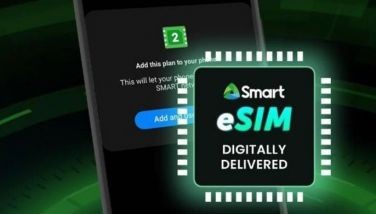Smart Click: ‘Broadbanding’ the countryside
July 8, 2006 | 12:00am
Gone are the days when far-flung provinces of the Philippines were isolated from the rest of the cyber-world due to the absence of links to the Internet.
In its goal to make the Internet and communication services available to every Filipino, especially for those who cannot afford home-based Internet access, Smart Communications Inc. has started the rollout of mobile Internet cafés nationwide.
Called Smart Click Internet and More, this latest innovation by Smart is unique. It is housed in a movable, air-conditioned 40-foot container van with 15 computers for rent, and serves as a one-stop digital shop in places with limited or no provisions for high-speed Internet.
Since it began its rollout last April, there are now 18 Smart Click branches nationwide, located in places such as Basco, Batanes in Luzon, Balangiga, Eastern Samar in the Visayas and Ipil, Zamboanga Sibugay in Mindanao.
"Smart aims to bring high-speed Internet services especially in so-called uncharted territories through Smart Click. Smart does this by using wireless broadband technology. We plan to eventually open 1,000 branches," said Tina Mariano, Smart’s Public Access Group head.
With wireless broadband, Internet connection is up to twice as fast as dial-up service, making surfing the Web and chatting online faster and easier.
"Projects like Smart Click prove that we can bridge communities in the Philippines by making Internet services more accessible to Filipinos," Commission of Information and Communications Technology (CICT) chairman Ramon Sales said.
"More people will have access to unlimited information, online education, and increased business opportunities through the Internet, thanks to Smart Click," he added.
At Smart Click, people can also quickly connect with friends and relatives abroad via e-mail, chat, or webcam. Desktop publishing services such as sending, printing and scanning of documents and photos, saving of files in CDs, among others, are also available, as well as online gaming.
Communities have been reaping the benefits of being connected to the World Wide Web. Teenager Orly Gecha, for example, lives in Batanes, the country’s northernmost province, 190 kilometers away from Aparri, the northernmost tip of mainland Luzon.
The Internet is Orly’s connection to the rest of the world. He uses it for research on school projects, online gaming with his buddies, and for chatting with friends. "The connection is fast!" he enthused.
Batanes Gov. Vicente Gato said, "With Smart Click, Batanes and its 7,000 population are no longer isolated. Previously, we have been isolated, not only geographically, but also in terms of communications. Our residents can now get in touch with relatives in the United States, Germany, Japan, and in other parts of the world."
For Mayor Sebastian Serrano of Catanauan, Quezon, having the latest in wireless communications technology will contribute to the progress of their town, a third-class municipality in the southernmost part of the province. Prior to the launch of Smart Click last June, the nearest Internet café was three hours away in Lucena City. The Smart Click Internet Café in the town is also the first in the entire Bondoc Peninsula.
Serrano is glad that they will be able to update the town’s homepage more often now that their municipality is connected to the Internet.
"I believe this is a big step for us Catanauanins. The Internet is the best way for a remote town like Catanauan to be linked to the rest of the world," he said.
Balangiga was also recently linked to the World Wide Web through Smart Click. A fifth-class municipality, it is located in the southern part of Eastern Samar, about 72 kilometers from Tacloban City. It is the center of trade in the cluster of Lawa-an, Giporlos and Quinapondan towns, with agriculture, fishing, and logging as its main industries.
"Businesses from the provinces can be more competitive. They can get customers abroad by marketing their products on the Internet. Through the Internet, the town can also invite more tourists to visit its historic sites," Mariano said.
Through the Smart Click Internet Café, the historic town of San Miguel, Bulacan can also now market its famous pastillas de leche online, to expand its customer base, she added.
Bulacan provincial information and technology head Rex Mangalindan said Smart Click would benefit the provincial government.
"We have limited computers and most of them have no Internet access. Having Smart Click near the provincial capitol is very strategic since we can use it as a training center," he said.
In Tandag, Surigao del Sur, provincial administrator Johnny Pimentel said Smart Click would benefit teachers. He said teachers now have access to computers, and the Internet.
Smart Click is designed to be mobile so it can be easily transferred in case of natural calamities, which is common is some of the provinces, Mariano said.
Broadband technology is used to connect to the Internet, so it is "wireless." Wireless broadband does not require telephone or cable connections to get Internet access. It instead makes use of Smart’s cell sites in the area.
The computer is connected by cable to an outdoor antenna on top of the trailer van. The "wireless" component is the direct "line-of-sight" connection from the outdoor antenna to the nearest Smart cell site for the strongest possible signal.
Mariano said the mobile Internet cafés may be franchised, and is ideal for local entrepreneurs who have genuine passion for propagating wireless broadband technology.
Smart started the rollout of Smart Click branches on April 1 in Ayala, Zamboanga. It subsequently opened branches in Basco, Batanes; Ipil, Zamboanga Sibugay; Sta. Maria, Bulacan; Bantayan, Cebu; Dolores, Eastern Samar; Malolos, Bulacan; Bulan, Sorsogon; Barobo, Surigao del Sur; Balangiga, Eastern Samar; San Juan, Leyte; Tandag, Surigao del Sur; Concepcion, Tarlac; San Jose, Antique; Baler, Aurora; Virac, Catanduanes; San Miguel, Bulacan; and Catanauan, Quezon.
"With Smart Click, residents of communities with limited connectivity can now access the Internet with just one click," said Mariano.
In its goal to make the Internet and communication services available to every Filipino, especially for those who cannot afford home-based Internet access, Smart Communications Inc. has started the rollout of mobile Internet cafés nationwide.
Called Smart Click Internet and More, this latest innovation by Smart is unique. It is housed in a movable, air-conditioned 40-foot container van with 15 computers for rent, and serves as a one-stop digital shop in places with limited or no provisions for high-speed Internet.
Since it began its rollout last April, there are now 18 Smart Click branches nationwide, located in places such as Basco, Batanes in Luzon, Balangiga, Eastern Samar in the Visayas and Ipil, Zamboanga Sibugay in Mindanao.
"Smart aims to bring high-speed Internet services especially in so-called uncharted territories through Smart Click. Smart does this by using wireless broadband technology. We plan to eventually open 1,000 branches," said Tina Mariano, Smart’s Public Access Group head.
With wireless broadband, Internet connection is up to twice as fast as dial-up service, making surfing the Web and chatting online faster and easier.
"Projects like Smart Click prove that we can bridge communities in the Philippines by making Internet services more accessible to Filipinos," Commission of Information and Communications Technology (CICT) chairman Ramon Sales said.
"More people will have access to unlimited information, online education, and increased business opportunities through the Internet, thanks to Smart Click," he added.
At Smart Click, people can also quickly connect with friends and relatives abroad via e-mail, chat, or webcam. Desktop publishing services such as sending, printing and scanning of documents and photos, saving of files in CDs, among others, are also available, as well as online gaming.
The Internet is Orly’s connection to the rest of the world. He uses it for research on school projects, online gaming with his buddies, and for chatting with friends. "The connection is fast!" he enthused.
Batanes Gov. Vicente Gato said, "With Smart Click, Batanes and its 7,000 population are no longer isolated. Previously, we have been isolated, not only geographically, but also in terms of communications. Our residents can now get in touch with relatives in the United States, Germany, Japan, and in other parts of the world."
For Mayor Sebastian Serrano of Catanauan, Quezon, having the latest in wireless communications technology will contribute to the progress of their town, a third-class municipality in the southernmost part of the province. Prior to the launch of Smart Click last June, the nearest Internet café was three hours away in Lucena City. The Smart Click Internet Café in the town is also the first in the entire Bondoc Peninsula.
Serrano is glad that they will be able to update the town’s homepage more often now that their municipality is connected to the Internet.
"I believe this is a big step for us Catanauanins. The Internet is the best way for a remote town like Catanauan to be linked to the rest of the world," he said.
Balangiga was also recently linked to the World Wide Web through Smart Click. A fifth-class municipality, it is located in the southern part of Eastern Samar, about 72 kilometers from Tacloban City. It is the center of trade in the cluster of Lawa-an, Giporlos and Quinapondan towns, with agriculture, fishing, and logging as its main industries.
"Businesses from the provinces can be more competitive. They can get customers abroad by marketing their products on the Internet. Through the Internet, the town can also invite more tourists to visit its historic sites," Mariano said.
Through the Smart Click Internet Café, the historic town of San Miguel, Bulacan can also now market its famous pastillas de leche online, to expand its customer base, she added.
"We have limited computers and most of them have no Internet access. Having Smart Click near the provincial capitol is very strategic since we can use it as a training center," he said.
In Tandag, Surigao del Sur, provincial administrator Johnny Pimentel said Smart Click would benefit teachers. He said teachers now have access to computers, and the Internet.
Smart Click is designed to be mobile so it can be easily transferred in case of natural calamities, which is common is some of the provinces, Mariano said.
Broadband technology is used to connect to the Internet, so it is "wireless." Wireless broadband does not require telephone or cable connections to get Internet access. It instead makes use of Smart’s cell sites in the area.
The computer is connected by cable to an outdoor antenna on top of the trailer van. The "wireless" component is the direct "line-of-sight" connection from the outdoor antenna to the nearest Smart cell site for the strongest possible signal.
Mariano said the mobile Internet cafés may be franchised, and is ideal for local entrepreneurs who have genuine passion for propagating wireless broadband technology.
Smart started the rollout of Smart Click branches on April 1 in Ayala, Zamboanga. It subsequently opened branches in Basco, Batanes; Ipil, Zamboanga Sibugay; Sta. Maria, Bulacan; Bantayan, Cebu; Dolores, Eastern Samar; Malolos, Bulacan; Bulan, Sorsogon; Barobo, Surigao del Sur; Balangiga, Eastern Samar; San Juan, Leyte; Tandag, Surigao del Sur; Concepcion, Tarlac; San Jose, Antique; Baler, Aurora; Virac, Catanduanes; San Miguel, Bulacan; and Catanauan, Quezon.
"With Smart Click, residents of communities with limited connectivity can now access the Internet with just one click," said Mariano.
BrandSpace Articles
<
>
- Latest
Latest
Latest
December 28, 2023 - 12:00am
December 28, 2023 - 12:00am
December 11, 2023 - 11:00am
December 11, 2023 - 11:00am
November 23, 2023 - 4:35pm
November 23, 2023 - 4:35pm
October 16, 2023 - 5:00pm
October 16, 2023 - 5:00pm
August 24, 2023 - 4:43pm
August 24, 2023 - 4:43pm
Recommended


























